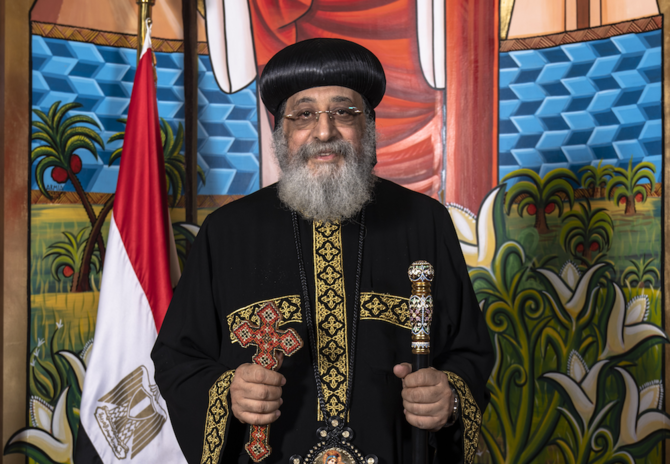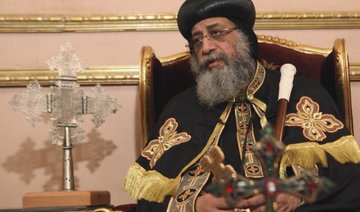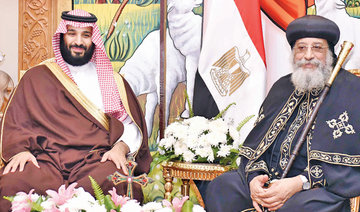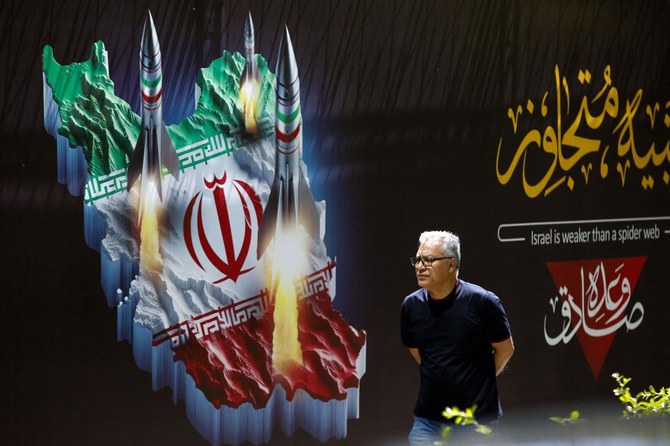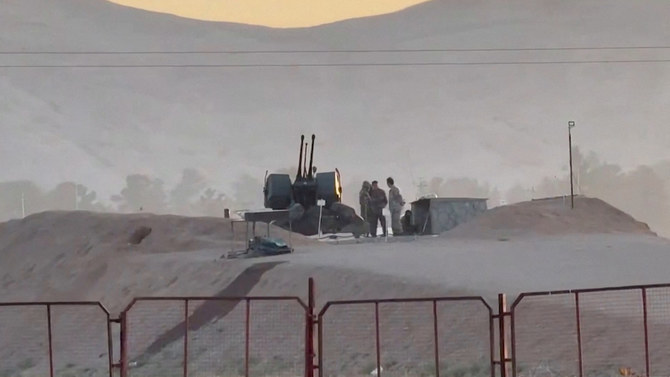CAIRO: It was July 21, 1969, and Neil Armstrong had just taken mankind’s first steps on the moon. In Egypt, 16-year-old Wagih Subhi Baqi Sulayman was transfixed by the achievement. More in hope than in any expectation of a reply, he wrote to the US astronaut asking for an autograph.
A few weeks later, to the young man’s surprise, an envelope arrived containing a signed, color photo of the moon landing.
Nearly 50 years later, while the hair is a little more gray, Wagih’s eyes remain very much on celestial matters. Of course, nobody refers to him by his birth name these days. For more than 100 million Egyptians, and to the rest of the world, he is now known as Tawadros II, the 118th Pope of Alexandria, Patriarch of the See of St. Mark and leader of the Coptic Orthodox Church of Alexandria.
He has, sadly, lost the moon landing photo — but never the memory of those days. With a soft voice and a gentle smile that lasted throughout our interview at St Mark’s Cathedral in the Abbassia district of Cairo, he recalled obtaining Armstrong’s address from a radio program on Voice of America that encouraged pen pals to write to him.

Pope Tawadros receives an Arab News cartoon commissioned in solidarity with Egyptians after a December 2016 attack on a church. The cartoon, by Mohammed Rayes, shows the word Cairo written using the C from a mosque’s crescent and a cross from a church. In picture: Editor in Chief Faisal Abbas and Noor Nuqali, Riyadh correspondent (AN photo)
“I sent him a letter, telling him I would love to see a color photo of him on the moon, because the newspapers used to publish his photo in black and white. I was surprised when I received the envelope.”
The teenager had assumed that Armstrong was named after the Nile River. “I was obsessed with his name. In the West, they are used to the name Neil. But here in Egypt no one would call his child Nile, although it is a beautiful name.”
The selection of Tawadros II as pope, a complex ritual, concluded in November 2012 and came at a difficult time for Egyptian Christians and the country in general. It was shortly after the collapse of the Mubarak presidency and coincided with the short-lived rule of the Muslim Brotherhood and the rise of Daesh.
Our regions have been established with the existence of Christianity, Islam and Judaism. The meetings that the crown prince and Saudi officials are holding are very beneficial to the nation and the Kingdom.
Pope Tawadros II
Tawadros leads nearly 15 million Copts in Egypt and a further 2 million abroad, according to the church’s registry. They practice a form of Christianity established 2,000 years ago by St. Mark, and, like most Christians and minorities in the region, have endured persecution at various times in their history.
Recently, however, the persecution has become so widespread that the Russian Foreign Minister Sergey Lavrov called for an effort to protect Christians in the Middle East. Pope Tawadros agrees the situation is alarming. “Emptying the Middle East of Christians poses a great danger to stability and peace,” he says. “Christianity is deeply rooted in the Middle East.When all our countries were established, Christians and Muslims were there, as well as Jews in ancient history.”
The pope describes events in Syria and Iraq, with the rise of Daesh, as “very painful,” and points out that Christians who had to flee and seek asylum abroad were among the most affected. However, his concerns extend beyond the plight of Christians alone, and he argues that a “weakening of Arab countries” means “the weakening of Arabs as a whole … Christians and Muslims alike.”
Nevertheless, when it comes to his home country of Egypt, Tawadros is slightly more optimistic. “If you read through history, you will find that the Lebanese emigrated three centuries ago. However, the Christians in Egypt only started to emigrate 50 years ago, and that was due to the conditions that existed then.”
Under Muslim Brotherhood rule in 2012-2013, Tawadros says, “Christians feared for their lives and fled the country. When the country regained its stability, a lot of them returned to Egypt. Christian emigration rates have dropped significantly.”
Despite the pope’s reassurances, many Copts are increasingly alarmed, their fear fueled by a surge in attacks on both them and their places of worship. Indeed, Egypt was highlighted as a country of concern in a report published this year by Open Doors, a US charity that supports persecuted Christians worldwide.
Tawadros says that these attacks are painful, but insists that their target is not Copts themselves or their churches, but “Egyptian unity.”
“To be fair, these attacks also targeted the armed forces, the police, and our brothers and sisters in mosques. One year ago, a mosque in Al-Arish region in North Sinai was a target for a terrorist attack where many Egyptians died.”
Nevertheless, one attack in particular this year was unprecedented. The body of Bishop Anba Epiphanius, abbot of the Monastery of St. Macarius, 100 km northwest of Cairo, was found with a crushed skull in his monastic cell in July. Those accused of the murder are traditionalists of his own faith, and they await trial. The crime appears to be directed at Pope Tawadros’ reformist, outward-looking and ecumenical policies.

The pope denies the existence of a split in the church and says life as normal carries on in all monasteries. Such a one-off crime may happen “at any time and place,” he says. “Even between the disciples of Jesus, there was a disciple called Judas who sold his soul to evil. The authorities are now investigating this crime and we are waiting for the findings.”
As for Pope Tawadros’ own political views, at first he resists my attempts to persuade him to reveal them. “Religion should not interfere with politics,” he insists. But this is the Middle East, and “even if religion doesn’t want to interfere in politics, politics will interfere with religion,” I persevere.
“The cause of crises in the world is this interference,” he replies with a sigh.
However, it would be a mistake to think that because the pope is reluctant to express his opinions, he does not have them. A year ago, he cancelled a meeting with US Vice President Mike Pence in protest at Washington’s decision to move its embassy in Israel to Jerusalem. The church said that the US decision had failed to “take into consideration the feelings of millions of Arab people.”
Tawadros views Palestine as an “occupied country,” and hopes a “spirit of understanding prevails” between Israelis and Palestinians so that Jerusalem can be a capital for both states “and peace reigns in the region.”
Leading a minority in a highly politicized part of the world, Coptic popes have always been careful with their positions. For instance, Cyril VI, pope from 1959 until his death in 1971, banned Copts from going to Jerusalem for pilgrimage after the Israeli occupation of 1967. The ban remained even after Egypt and Israel signed their peace treaty in 1979, and officially still does.
“The normalization … was between the Egyptian government and the Israeli government, but not between the two peoples,” explains Tawadros. However, he argues that the ban has ended up harming the Coptic presence in the Holy Land, and the rules have been slightly relaxed to allow elders who have children living abroad to travel to Jerusalem.
Tawadros himself made a rare visit there in 2015, to lead the funeral prayers for Bishop Abraham, the Coptic Metropolitan Archbishop of Jerusalem and the Near East. He also visited the Vatican in 2013, the first visit of a Coptic pope in 40 years, and his last trip was in July this year. “It is a good relationship based on friendship and love with Pope Francis,” he says. “There is a dialogue committee between us and the Vatican that meets annually.”
Meanwhile, on a state visit to Egypt this year, Saudi Crown Prince Mohammed bin Salman invited Tawadros to the Kingdom, and all eyes are on when that visit might take place.
Tawadros found the crown prince “an open-minded person who has a modern vision to life, and this pleases us a lot. I personally follow all the positive developments that took place under the directives of King Salman, his crown prince and all Saudi officials, especially since Saudi Arabia is a main pillar of the Arab and the Islamic world, and on the international level as well.
“The meetings that the crown prince and Saudi officials are holding on all levels, whether religious, political or cultural, are very beneficial to the nation and the Kingdom and contribute to human development. We hail and appreciate these efforts that encompass a lot of hope for our brothers in Saudi Arabia.
So when will Pope Tawadros visit the Kingdom? “There is no specific time for the visit, but it will take place when God wishes,” he says.




